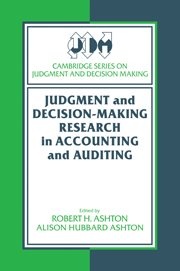Book contents
- Frontmatter
- Contents
- Contributors
- Series Preface
- Preface
- Acknowledgments
- Part I Overview
- Part II Judgment and decision-making research involving users of accounting information
- 2 Decision-making research in managerial accounting: Return to behavioral-economics foundations
- 3 Experimental incentive-contracting research in management accounting
- 4 Judgment and decision-making research in financial accounting: A review and analysis
- 5 The individual versus the aggregate
- Part III Judgment and decision-making research involving auditors of accounting information
- Part IV Conclusion
- References
- Index
2 - Decision-making research in managerial accounting: Return to behavioral-economics foundations
Published online by Cambridge University Press: 03 May 2010
- Frontmatter
- Contents
- Contributors
- Series Preface
- Preface
- Acknowledgments
- Part I Overview
- Part II Judgment and decision-making research involving users of accounting information
- 2 Decision-making research in managerial accounting: Return to behavioral-economics foundations
- 3 Experimental incentive-contracting research in management accounting
- 4 Judgment and decision-making research in financial accounting: A review and analysis
- 5 The individual versus the aggregate
- Part III Judgment and decision-making research involving auditors of accounting information
- Part IV Conclusion
- References
- Index
Summary
Introduction
There is a long–existing gap in accounting research, something like the Grand Canyon, between economics–based and psychology–based perspectives. The gap was originally delineated by a pioneering behavioral accounting researcher (Caplan, 1966, 1971) and recently found intact by nonbehavioral surveyors (Burgstahler and Sundem, 1989). Like all empirical phenomena, the gap has a cause and an effect. The cause of the gap is psychological. It is a hard–wired fact that accounting researchers and doctoral students have information– processing limitations; they must specialize to attain a measure of academic competence. The effect of the gap is economic. Intellectual resources are allocated among institutional positions, e.g., university faculty and editorial boards, in a manner that perpetuates and enlarges the gap. Will this pattern continue? The pessimist may cite recurrent observations of fresh doctoral students quickly fixing their thinking on either economic or psychological bases, but not both. Alternatively, the optimist may see hope in the same observations of malleable doctoral students. Things may change, the gap may be crossed, but only if (some) accounting researchers broaden their perspective and training.
Like the Grand Canyon, one should not attempt to cross the economicspsychology gap in a single leap. A more reasonable plan is to start on one side, slowly work one's way down to deeper levels, and then find a path up the other side. Further, unless one is thoroughly familiar with both sides, it is best to stick to established trails, despite the switchbacks. Fortunately for accounting researchers, there already exists a network of trails connecting the sides of the economics–psychology gap.
- Type
- Chapter
- Information
- Publisher: Cambridge University PressPrint publication year: 1995
- 10
- Cited by

